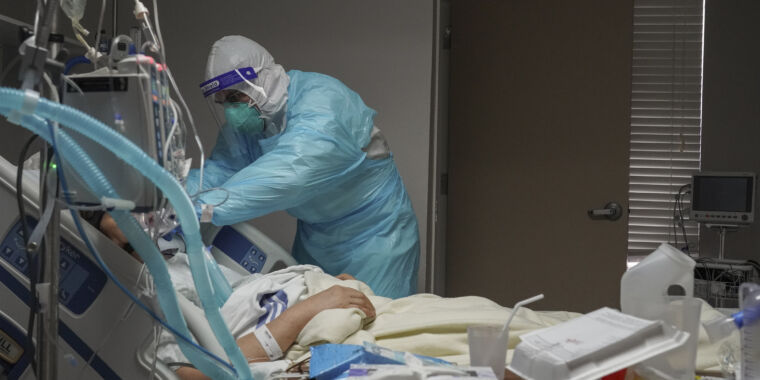
An anti-inflammatory drug for arthritis called tocilizumab modestly reduces deaths and hospitalizations in patients with severe COVID-19, according to preliminary data from a randomized trial of more than 4,000 patients.
Among hospitalized patients requiring oxygen in the study, there were 596 deaths in the group of 2,022 patients randomly assigned to take tocilizumab – 29 percent died – and 694 deaths in the group of 2,094 patients randomly assigned to standard treatment – 33 percent died. This is an absolute difference of 4% in deaths and a drop of 14% in the relative mortality rate.
Tocilizumab also appeared to shorten hospital admissions, increasing the chances of surviving patients from leaving the hospital within 28 days after randomization from 47% to 54%.
Finally, the arthritis drug also appeared to help prevent the disease from progressing to the point where patients needed mechanical ventilation, reducing the mechanical ventilation rate from 38% to 33%.
The benefits seen in the study were in addition to the benefits already seen while using dexamethasone, a cheap, readily available and easy-to-use steroid previously discovered to reduce deaths in patients with COVID-19. In both patient groups – tocilizumab and standard treatment groups – dexamethasone was administered to 82 percent of patients.
The trial’s findings – published online but not yet peer-reviewed – suggest that the combination of the two drugs may further decrease the death rate of the devastating pandemic.
Of course and welcome
However, compared to dexamethasone, tocilizumab is not so cheap, is readily available or is easy to use. The drug is a monoclonal antibody that basically blocks the signaling of the immune system that leads to inflammation. Antibody treatment needs to be administered intravenously, while dexamethasone can be administered orally, by injection or intravenously. And while dexamethasone can cost around $ 7 a course, tocilizumab can cost around $ 700.
As such, it is unlikely that tocilizumab will be a major success used everywhere in the fight against COVID-19. Still, with the scarcity of effective treatments for serious illnesses, doctors are likely to be eager to add it to their arsenal when possible.
The data – from the huge RECOVERY trial run in the UK – adds clarity to one of the many obscure research areas of COVID-19. In the past, seven smaller trials have also examined the use of tocilizumab to treat critically ill patients with COVID-19. However, the results were mixed and collectively inconclusive. RECOVERY, on the other hand, had data on three times as many deaths as all seven combined trials and was able to make a clear conclusion.
“Previous tests with tocilizumab have shown mixed results and it was unclear which patients could benefit from treatment,” said emerging infectious disease specialist and RECOVERY co-leader Peter Horby in a press release. “We now know that the benefits of tocilizumab extend to all COVID patients with low oxygen levels and significant inflammation. The double impact of dexamethasone plus tocilizumab is impressive and very welcome. “
